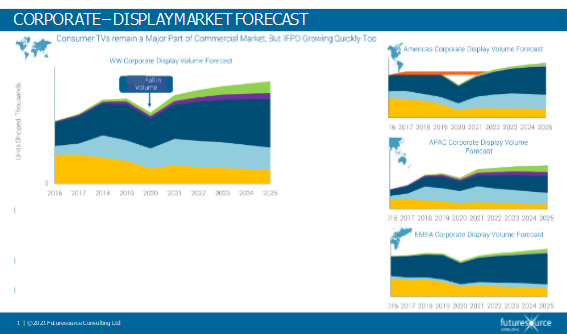Companies operating in the professional displays market experienced a bleak 2020, with value dropping by more than 15% year-on-year. Yet 2021 has seen a turnaround, and the market is on course to end on a high. That’s according to a new competitive review report from market research firm Futuresource Consulting, which forecasts an increase of more than 27%, finishing the year at a global value of $36 billion.

Professional Displays on the up Against the Odds
“2021 has been a tremendous success for many pro display vendors,” says Matthew Rubin, Senior Market Analyst at Futuresource Consulting, “but there was plenty more promise in the market that remained unfulfilled. Chip shortages, partly born from years of consolidation within the semiconductor industry made the industry vulnerable to the challenges of COVID-19. The pandemic caused disruption, factories closed due to an assumed drop in demand, and natural disasters also played their part. Earthquakes hit a Japanese semiconductor manufacturing plant, winter storms struck a Texas plant, and a fire and severe drought slashed production in Taiwan.”
“In addition to this, some vendors have suffered due to under-forecasting the recovery and falling to the back of the queue for component orders. As we emerge from the turmoil, it’s astounding how much market rebound has been achieved against all the odds.”
LED Market Movements Creating New Opportunities
Pre-pandemic, Futuresource Consulting’s research shows how the LED market was already a fast-growing segment, and its fortunes have now been realigned to create further opportunities. Product quality has matured, brand equity is moving to the forefront and the downstream supply chain is placing more emphasis on the combined offering of product, solution and service. This demand for a more premium solution is destabilising the technology leadership of Chinese brands.
As many major international professional display brands began ramping up their operations, Chinese brands began to retreat, pulling back staff to focus on opportunities in the domestic market. This has radically altered the market landscape, and underlines the strength of these international brands, which are able to reach globally and support locally.
“We expect the future of LED to move from strength to strength,” says Rubin. “Our forecasts indicate a CAGR of 22.4% in the five years out to 2025. Product awareness, improved end user understanding and falling prices will all contribute to wider uptake.”
A Transition to MicroLED
In Pro AV markets and applications, Futuresource explain how a gradual transition will see the market evolve from surface mount device (SMD) LED, through MiniLED to MicroLED. Despite MiniLED being primarily a transitional technology, Futuresource expects all three technologies to coexist in the narrow pixel pitch market segment, as highlighted in their latest MicroLED report.
Due to market pricing considerations, Pro AV will be a large early adopter of MicroLED, with growth slowing in later years. Conversely, early CE market adoption will be limited, but falling ASPs will generate mass CE markets in later years.
Retail and Kiosks Riding High
“Moving forward, bricks and mortar retail, as well as kiosk activities, will lead the charge for new professional displays opportunities,” says Rubin. “By personalising the online and offline shopping experience through targeted information and advertising, retailers can reimagine retail as a series of memorable events, driving engagement and increasing profit margins. Watch out for smart stores, with sensors feeding data back to track consumer shopping behaviour.”
Futuresource’s research demonstrates that kiosks will also begin to pervade many areas of retail, stepping beyond quick-service restaurant environments as consumers become more familiar with the tech. In a post-COVID world,kioskswill support social distancing, while eliminating human error, speeding up serving time and offering ease of use in different languages. Further down the line we could see next gen displays with gesture control, automated COVID-19 testing kiosks, and augmented reality ushering virtual dressing rooms onto the high street.


